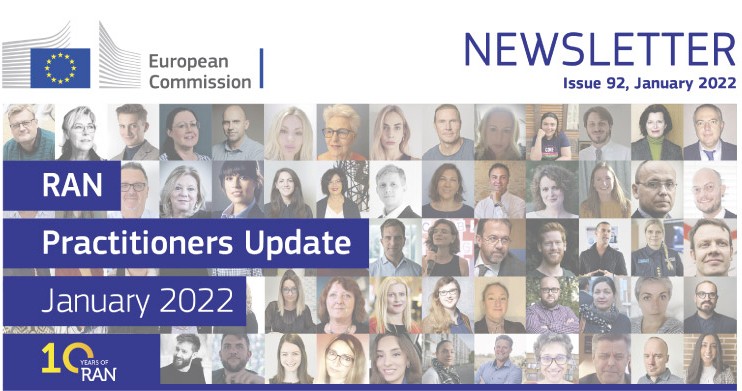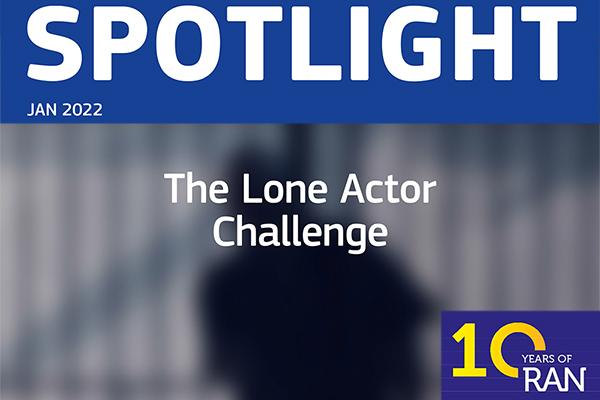
The Lone Actor challenge within P/CVE is not a new phenomenon, with tragic examples stretching back throughout history. Indeed, RAN practitioners will recall all too quickly the sudden onset of lone actor attacks ‘inspired’ by Daesh across Europe and the world following the group’s emergence and subsequent fall in Syria and Iraq, the range of violent right-wing extremist-inspired attacks across the globe since 2017, whilst the events at Utøya, Norway in 2011 subsequently led to the creation of the RAN itself. However, towards the end of 2021, lone actor attacks in Kongsberg, Norway and Leigh-On-Sea, United Kingdom, have brought the topic back into prominence for all practitioners working in P/CVE.
This month’s RAN Practitioners Update, the first of the new year, focuses on the emerging and evolving lone actor challenge, particularly in the wake of the accelerated digitalisation brought about by the ongoing COVID-19 pandemic. The Update links to the latest RAN Practitioners Spotlight Magazine which focuses on the topic, with articles and interviews from practitioners and academics on the frontline of this challenge. The Update also links to a new thematic film which hears from academic experts, practitioners and Working Group Leads, as well as a newly released RAN Practitioners paper on Lone Actors in Digital Environments.
The Evolving and Emerging Lone Actor Challenge
The latest edition of the RAN Practitioners Spotlight magazine features a series of articles, case studies and interviews with practitioners and Working Group leads discussing the evolving and emerging lone actor challenge. The magazine assesses various aspects of the challenge, including the impact of COVID-19, its development from both an extreme right-wing and Islamist perspective, the work being done with vulnerable individuals known to authorities, and general tips for RAN Practitioners working in this sensitive space.

This new panel-based film digs deep into the current picture behind the lone actor challenge. In the film we hear from academic experts in the field who have recently produced research papers for RAN on the topic, as well as RAN Working Group Leads and Practitioners as they discuss how the challenge has developed across the extremist spectrum, and how RAN practitioners are best placed to respond.
This new paper aims to provide an overview of digital environments and their impact on lone actors. The paper draws insights from qualitative research and monitoring of RWE online subcultures that reveals a shift towards a post-organisational reality, whereby online structures and subcultural milieus could be equally important for inspiring violence as connections to groups in the physical world. The paper looks to understand this emerging trend, recognising the online communities that violent right-wing extremists use to produce a sense of belonging, spreading dehumanising propaganda, and promoting acts of violence.

Upcoming Events
Due to the global COVID-19 pandemic, RAN Practitioners will continue to deliver the majority of meetings in the coming months online. For more information on planned meetings please go to the RAN website.
Publications
Focus on Children: The challenge to reflect on values with imprisoned extremist parents
A new paper that provides an overview of projects in Europe concentrating on parents in prison, their children or both. Most of the projects focus on strengthening parenting competence and encouraging bonds and communication between imprisoned parents and their children. Even though the authors’ work is primarily concerned with parents holding right-wing extremist attitudes, some of its elements are applicable to any form of extremism.
The role of psychotherapy in rehabilitation and exit work
This new paper highlights the growing focus on the intersection between mental health and the field of preventing and countering violent extremism (P/CVE). In the past, researchers tended toward the view that it was people with mental health illnesses or psychopathic tendencies who committed extremist acts. Scholars later eschewed these explanations in favour of the theory that radicalised individuals were rational actors in pursuit of specific objectives. Now, overwhelmingly, the current literature recognises that the pathways to radicalisation are complex, multifaceted and interconnected, and that there is no ‘single pathway’ to radicalisation.
National hubs supporting local actors in P/CVE - practitioners’ insights
A new paper that looks at the key role that local actors play in effective efforts to prevent and counter violent extremism. When it comes to addressing challenges of radicalisation and violent extremism, local municipalities and authorities together with and supported by national governments, often bear the primary responsibility. In past years, a variety of local approaches has emerged across Europe, each of them informed by different local settings, governance structures, resources and needs assessments and all of them guided by different national prevention strategies.
Incels: A first scan of the phenomenon (in the EU) and its relevance and challenges for P/CVE
A new paper that intends to demystify key tenets of the incel ideology and its relationship to violence, outline key challenges for practitioners in prevention and countering of violent extremism (P/CVE) in reaching this community, and offer recommendations for intervention providers and practitioners to increase and improve work related to this phenomenon.
Returning to extremism: An overview of terrorist reoffending and current challenges
A new paper that aims to provide recommendations for practitioners working with violent extremist clients by discussing recidivism data, current challenges, risk and protective factors, and risk management strategies. Due to recent tragic terrorist attacks in Europe, the question of terrorist recidivism has come to the centre of attention in public and policy discourses. Although the data show low recidivism rates in European countries, the impact of successful re-offenses are enormous and prompts the revision of existing practices.
Extremists’ use of gaming (adjacent) platforms - Insights regarding primary and secondary prevention measures
This new paper discusses how traditional gaming (adjacent) platforms have contributed to extremist activities. Non-gaming platforms must be considered in addition to classic platforms focused on gaming. The paper also explores how extremist individuals and organisations make strategic and organic use of the platforms. The paper goes on to focus on opportunities for primary and secondary prevention on gaming (adjacent) platforms. As there is little experience of P/CVE measures on these platforms, the paper provides considerations and recommendations that should be taken into account when designing and implementing prevention efforts in these environments.
Between extremism and freedom of expression: Dealing with non-violent right-wing extremist actors
This new paper asks the question: How can youth, family and community workers intervene in radicalisation processes without infringing on personal freedoms? The paper focuses on right-wing extremism (RWE) and freedom of expression. It provides advice from first-line practitioners on how to deal with and respond to extremists publicly expressing their ideologies in a non-violent, but still potentially harmful, way. It also delves into the matter of how practitioners can protect themselves against potential backlash and threats of violence from extremist organisations or movements.
Contact us
RAN Practitioners is implemented by RadarEurope, which is a subsidiary of the RadarGroup:
- Phone: +31 (0)20 468 06 08 (office)
- E-Mail: ran
 radareurope [dot] nl (ran[at]radareurope[dot]nl)
radareurope [dot] nl (ran[at]radareurope[dot]nl)
Would you like more frequent updates on RAN’s activities? Gain access to all public RAN papers as they are published, other RAN news and thought-provoking articles on the radicalisation process by following RAN on:
